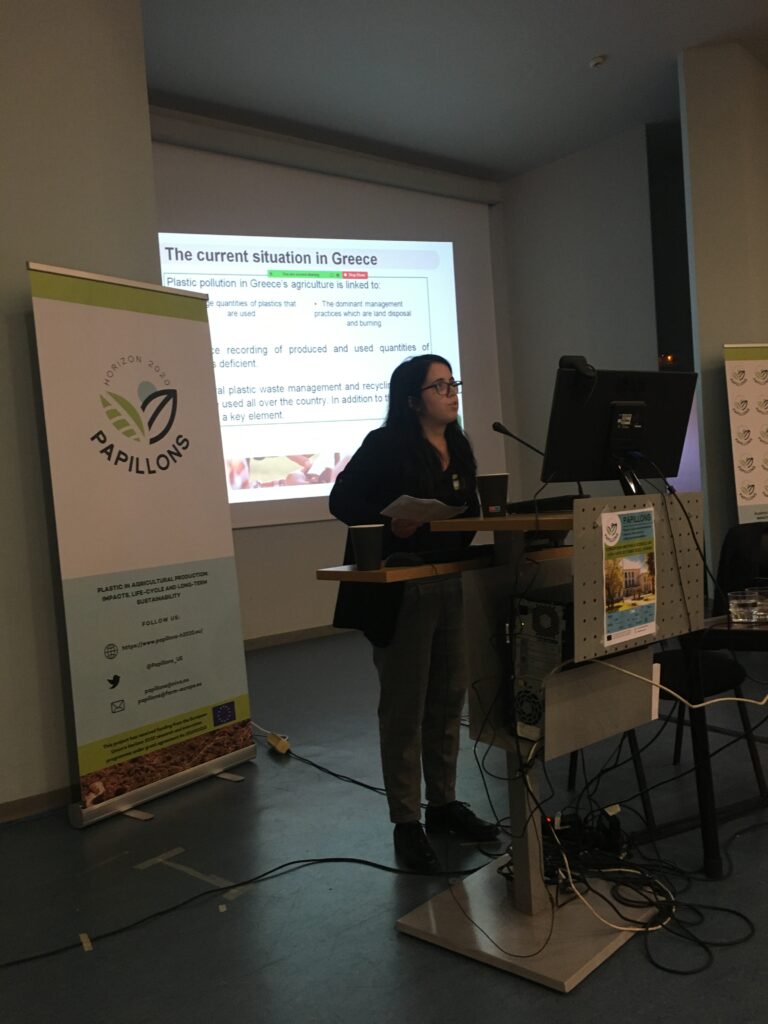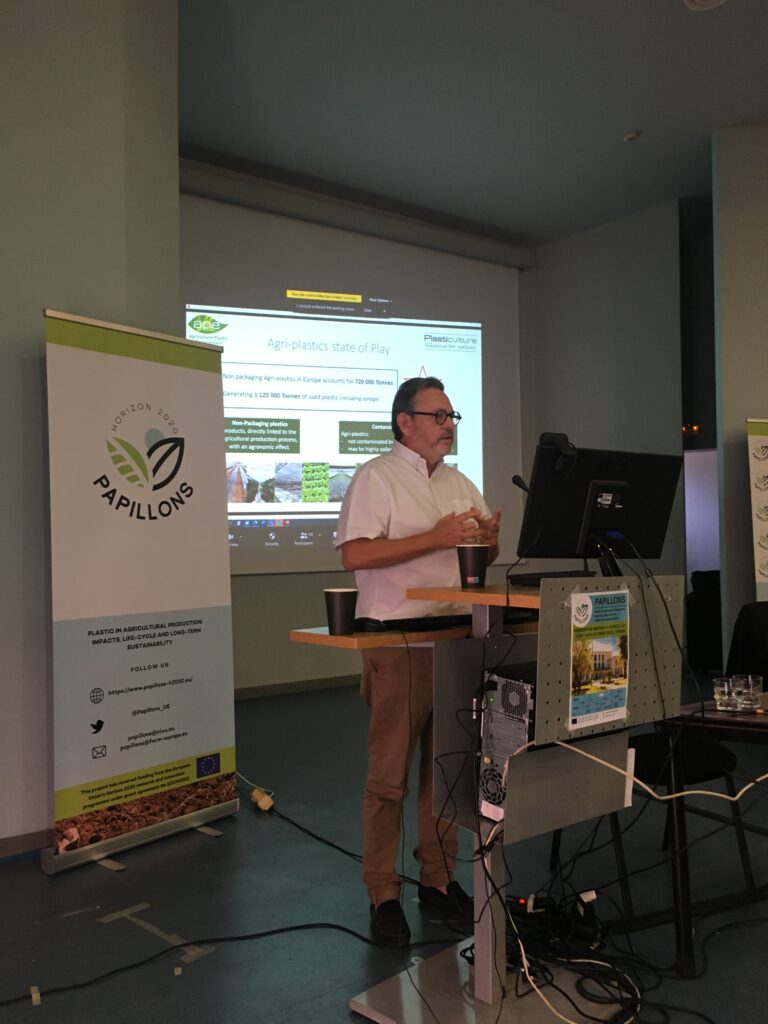
Maria Korre on behalf of the Greek GAIA EPICHEIREIN

Speaker Bernhard Le Moine from Agriculture Plastic & Environment (APE Europe)
As a follow-up to our first joint stakeholder forum meeting with the MINAGRIS research project, the PAPILLONS project has organized the next such event on the 14th of October in sunny Athens.
Various stakeholders and organizations, who have an interest in agricultural plastics, were invited to attend the event from all over the world, resulting in over 250 people registering online as well as stakeholders in person in Athens at the same time.
The topic of the Forum was: Plasticulture: an international perspective on environmental sustainability. We aimed to provide our international stakeholders an opportunity to gain insights and participate in the debate on international policy developments on the use of plastic in agriculture. The event came at a very relevant time in terms of policymaking. The first session of the Intergovernmental Negotiating Committee (INC1) to develop an Internationally legally binding instrument on plastic pollution is soon upcoming this November, while the EU is working to establish a clear policy framework on biobased, biodegradable, and compostable plastics as well.
Scientists have therefore presented the latest updates from their research activities on the use, diffusion, management, and ecological impacts of agricultural plastics emerging from PAPILLONS and MINAGRIS projects, and other research activities.
Here, Esperanza Huerta Lwanga introduced first the approach and progress of the twin-sister project of PAPILLONS, MINAGRIS (MIcro- and NAno-Plastics in AGRIcultural Soils: Sources, environmental fate, and impacts on ecosystem services and overall sustainability), from the Wageningen University.
After that, researchers from PAPILLONS showcased their ongoing efforts to fill the existing knowledge gaps. The list of speakers involved:
A wide range of topics was invoked during their excellent presentations. It included themes such as the quantification of micro- and nanoplastics in agricultural soil, field plot experiments, mesocosm studies, or the effects of conventional and biodegradable microplastic particles on plants with even some preliminary results to be shared!
Following the international theme of the event’s topic, our first guest speaker was Richard Thompson, who has been a chemicals and waste consultant, with experience in agricultural plastics within the UN. He has kindly shared with us the work of FAO on agricultural plastics, including the development of a Voluntary Code of Conduct on the sustainable use of plastics in agriculture.
Moreover, FAO and UNEP teamed up last year to launch the Global Assessment of Soil Pollution, which details the risks and impacts of soil pollution on human health, the environment, and food security. Therefore, our next speaker Kristina Thygesen, from GRID – Arendal, which is a UNEP Partner, highlighted how plastic is infiltrating the world’s soils and urged us to look to Nature for solutions.
Speaking on behalf of the industry, Bernhard Le Moine from Agriculture Plastic & Environment (APE Europe), which is a professional association bringing together companies and organizations involved in agri-plastics, gave an overview of the agri-plastics market and called for a Global Extended Producer Responsibility, while underlining the commitments to improve professional practices.
On the other hand, Sophie Vonk presented the viewpoint of the NGOs, from the Plastic Soup Foundation (PSF), which is a non-profit marine conservation organization that aims to reduce plastic pollution. She focused on the question of how to feed the world without plastic harm, and brought attention to the devastating impact plastic can have on the living environment. Apps developed by the team of PSF such as ‘My Little Plastic Footprint’ or ‘Beat the Micro Bead’ could help any average consumer to limit their plastic pollution.
Last, but not least, Maria Korre & Angeliki Lagogianni, talked on behalf of the innovative GAIA EPICHEIREIN, to shed light on the local farmer’s perspective. They depicted the current situation in Greece on plastic waste management in agriculture and underlined that farmers’ needs include:
Being properly informed regarding innovative alternatives to the plastic used in agriculture, and
To be trained on how to develop a set of good farm practices to reduce, reuse and recycle the plastic used in agriculture
Speakers from online joined in as well, such as Professor Defu He, who presented the state of the art from Chinese research titled “Plastic pollution in agricultural soil in China: Current situation and countermeasure analysis. At the same time, Pierre de Lépinau, the general manager of ADIVALOR, which defines the technical modalities of the collections, organizes, and finances all or part of the elimination of agro-supply waste, showcased the current mechanisms of collections and recycling of agri plastics in France based on 20 years of experiences.

Maria Korre on behalf of the Greek GAIA EPICHEIREIN

Speaker Bernhard Le Moine from Agriculture Plastic & Environment (APE Europe)
As a closure, our Project Coordinator, Luca Nizzetto, has brought attention to the IKHAPP initiative, which stands for the International Knowledge Hub Against Plastic Pollution, representing a community of scientists & experts working to address global plastic pollution.
After a panel discussion with a Q&A session, we had a roundtable with our stakeholders, and interested participants to further discuss potential synergies between the research project and their activities.
We would like to thank all of our speakers and participants once again, and hope to have contributed with our scientific work and research into designing science-based solutions and to enlighten the topic of the international perspective on environmental sustainability by bringing together such a diverse group of experts.
If you missed the live event, you can rewatch an edited version here!